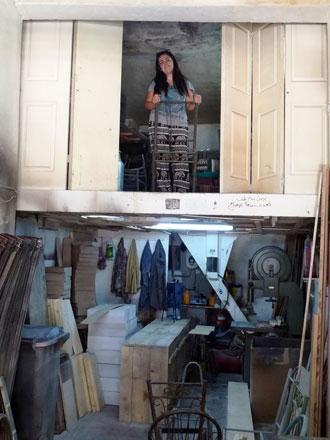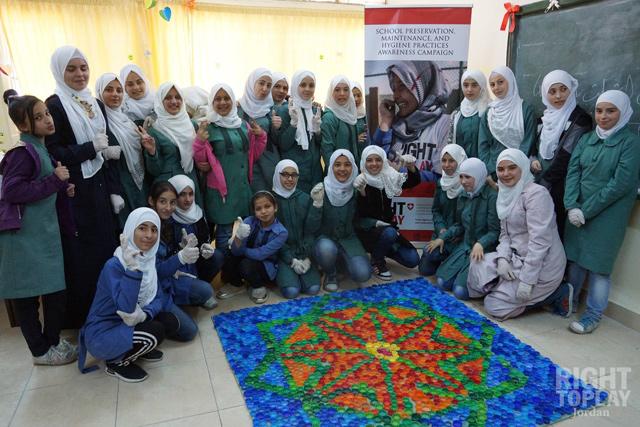You are here
Turning trash into money: Irbid women improve livelihoods through recycling
By Camille Dupire - Aug 13,2018 - Last updated at Aug 13,2018

Sameera Al Salaam, a 53-year-old Syrian woman, is sitting in her Irbid home, surrounded by items she made from recycled rubbish (Photo courtesy of Aida Burnett-Cargill/ACF)
AMMAN — While collecting rubbish to make a living can seem unusual to some, it was the idea behind the successful “Waste to positive Energy” project conducted by international NGO Action Against Hunger (ACF) in Jordan, which helped 1,194 vulnerable individuals around Irbid, including 550 women, to increase theirs and their families’ livelihood.
Turning waste issues into work opportunities
“At the beginning, the response to the idea of women collecting trash was negative, not only from the women but also from their families,” said ACF Project Manager Sajeda Saqallah, adding, “ACF looked into actions to involve women in cleaning campaigns, taking into account the harsh economic conditions women face in this border town.”
Started in 2017, the cash for work recycling project employed Syrian refugees and vulnerable Jordanians on a 50-day-fixed-term contract, where they collected and sorted waste in the local area, later turning them into salable items.
“Choosing to focus on waste collection to help alleviate poverty stemmed from various reasons: First, it is widely acknowledged that waste and open dumps are one of the most challenging topics in Jordan, with municipalities struggling to clean their over-burdened governorates,” Saqallah told The Jordan Times, noting that the large influx of refugees, especially from Syria, has greatly increased the pressure put on the Jordanian economy and its infrastructure.
With over 81 per cent of refugees living in urban or rural communities, according to the UNHCR July data, refugees have contributed to an increase in the waste present in host communities.
“Our aim was to enhance refugees and local communities’ living condition through waste reuse and up-cycling [the transfer of waste into useful items that can be used and sold],” the ACF official said, noting that, as well as receiving training, the project’s employees earned JD12 a day, “a great help for these vulnerable women”.
“For many Syrian refugees, this was the first time they had an opportunity to earn money and integrate into the local community in Irbid,” Saqallah noted, adding that the project also provided them with a Jordanian work permit valid for one year.
Escape from a
tough reality
Thirty-nine-year-old Aswaf Qaddah fled Syria with her three children after her husband, two brothers and father were killed. Following a short period living in Zaatari camp, Qaddah ressetled to Irbid, finding herself the sole provider for her sons, aged 3, 10 and 12 years old.
She quickly learned about the “Waste to Positive Energy” project, which helped her cater to her household’s basic necessities, like buying a fridge.
“We don’t have much money and the food I would buy kept spoiling, so I mainly wanted to buy a fridge,” she recounted, adding that she also used the money to buy food and clothes for her children, and pay her rent.
As well as earning an income, the project also gave her the chance to meet other women in her community. “When I moved to Irbid, I knew nobody. The project was really good as it took me out from the situation and the atmosphere I was living in and I got to meet new people,” she remembered, saying “I started to make some friends. We would have conversations. We got to know each other more and more. Now I have a good connection and I’m friends with Syrians and Jordanians.”
Thanks to the one year work permit she got from the project, Qaddah later managed to start working as a cleaner around Irbid, once her 50-day contract finished.
“It’s not shameful that women go out and work. I have no brother, father or husband to help so I have to find work. I’m happy and proud to do it. Now I know I am strong and can rely on myself to let my children live a normal life,” Qaddah stressed.
Combating 'culture
of shame'
Although the industry of recycling and upcycling is not very developed in Jordan, the project managed to train women on simple waste up-cycling with very simple tools and low value items such as newspaper, cardboard, plastic and metal cans, Saqallah explained.
“We searched for simple waste up-cycling tips and individuals who practice waste up-cycling which we transferred to the women who can now produce carrying bags, bowls, chairs and light fixtures out of newspapers or plastic cans,” she said.
“Through this project, women became more confident and supportive to their families; Syrian and Jordanian women were integrated together, exchanging culture and cuisine,” Saqallah recounted, citing how the workers created WhatsApp groups through which they shared news and updates related to the local life.
“Since I worked with ACF, my personality became stronger; I met new people, and felt that people around me feel me and understand me. I finally felt relaxed when I saw how everyone tried to help, I did not feel like an alien anymore: This is why I felt relieved deep inside,” Sameera Al Salaam, from Nawa, Syria, said.
By bringing vulnerable women together, the project enables them to talk to and support each other through their experiences.
“We were there for one another,” Al Salaam remembered, stressing “while some women are ashamed of collecting rubbish, with some lying to their husband and children, I really did not care. There is no shame in working whatsoever.”
She was one of the first women to sign up to the project and is now part of a group of Irbid women who meet regularly to turn waste products into functional and decorative items.
“I always had a passion for art,” she said, expressing her happiness to turn waste products into beautiful items.
The project, which concluded its first phase, is expected to resume in September, focusing on the up-cycling aspect, Saqallah noted.
The ACF project is supported by GIZ, a special initiative of the German federal ministry for economic cooperation and development.
Related Articles
IRBID - S ameera Al Salam folds a discarded piece of newspaper into a long strip then loops it round her finger to form a tight circle, the
AMMAN — What began as an eco-friendly alternative to expensive home decor, turned into an opportunity for a young Jordanian woman to form a
AMMAN — Children from public schools are acquiring the responsibility of recycling and self hygiene through the “School Preservation, Mainte














